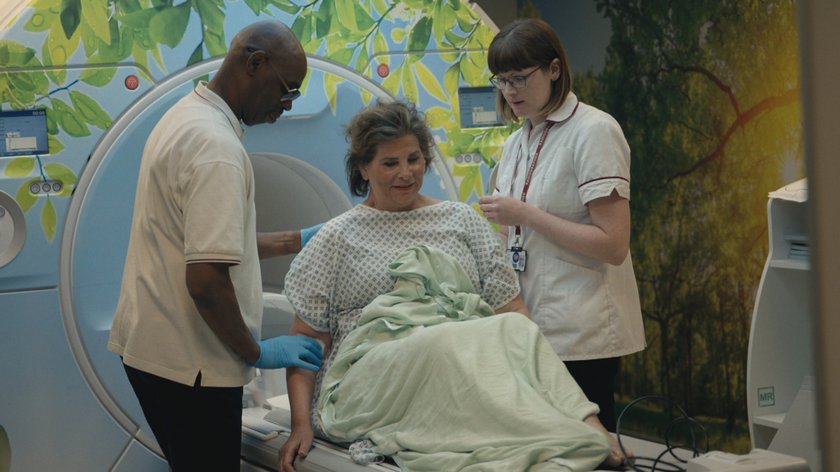A Cambridge researcher offering new hope to people with brain tumours is the focus of a documentary exploring the science behind the next big breakthroughs.
Dr Richard Mair, a neurosurgeon at Addenbrooke’s Hospital and a University of Cambridge scientist, features in the Channel 4 series Cancer Detectives: Finding the Cures showcasing the pioneering research that is changing how we prevent, detect and treat the disease.
During the opening sequence, Mair describes how we are “at the dawn of a new series of cancer treatments” and have “the opportunity to change medicine forever”.
The proof lies in his revolutionary approach to glioblastoma that has led to a world-first clinical trial using personalised treatment. With survival measured in months rather than years and very little progress for decades, patients with this fast-growing type of brain cancer have been left in limbo – until now.
Cancer Detectives: Finding the Cures airs Thursday 27 November at 9pm, watch or stream on Channel 4, in partnership with Cancer Research UK
Link: https://www.youtube.com/watch?v=fQWEkwlb4jM
When you see these patients, week in week out, telling them ‘I’m very sorry but there is nothing we can do,’ absolutely nothing - I think if that doesn’t motivate you to try and turn the train around then I don’t know what will.
Dr Richard Mair
That determination is the driving force behind Mair’s 5G trial (opens in a new tab), featured in the documentary, where he uses rapid whole-genome sequencing to decode the genetic makeup of each patient’s tumour and match them with targeted drug therapies - in as little as three weeks. It’s a personalised treatment model that could redefine brain cancer care.
Unlike traditional brain cancer trials that test one drug at a time, ‘5G’ - supported by the Cancer Research UK Cambridge Institute - tests several at once to see which ones work best for different patients. The team continuously fine‑tunes and adapts in real time, ensuring every treatment is precisely tailored to each individual.
Dr Mair is quick to praise Cambridge’s leadership in genome analysis as central to the trial’s speed and precision.
Cambridge scientists are helping to create a world where cancer doesn’t win. A trial like this would have been impossible five years ago. What once took months – time patients didn’t have - can now be done in weeks. It could be the biggest leap forward in brain cancer for 30 years and finally shift outcomes for glioblastoma by identifying new treatments that previously wouldn’t have been available to these patients.
Dr Richard Mair
Amanda Grayling, 63, a former finance director from Suffolk, is one of the first to benefit.
After her glioblastoma returned post-surgery, rather than receiving generic chemotherapy, her tumour’s DNA was analysed and matched with a targeted drug. The documentary reveals that five months into treatment, her scans show no growth and some signs of shrinkage.
I was really surprised to find out that there was still some hope for me. So, I was thrilled to join the trial. If the new treatment gives me a little more time, that’s everything. It’s lovely to look forward to booking holidays and picking places to go to – to think about the future again.
Amanda Grayling, trial participant
The Cambridge episode of the programme is titled ‘Time Trial.’ Being able to act quickly before glioblastoma progresses can make a critical difference.
Amanda, who says she is growing stronger each day and hopes to travel to Australia soon to see her family, added:
“It feels strange watching myself back on TV—I look like a different person. But now I’m doing much better and feel more like my old self. Research is the key, and I chose to take part because I wanted to share my story, raise awareness, and emphasise the urgent need for more research to treat this disease.”

Dr Mair, who says his patients’ courage continually inspires him, explains:
It’s a race against time. Brain cancer robs people of themselves. It strips away personality and function. We hope the 5G trial can help restore some of that and give more people a chance at a more normal life.
Co-led by Professor Juanita Lopez of The Institute of Cancer Research, London - who also features in the episode - the trial is partly funded by Cancer Research UK, The Institute of Cancer Research (ICR) and Minderoo Foundation. Pharmaceutical partners are supplying drugs already approved for other cancers, accelerating the path to treatment.
Recruitment to the 5G brain trial is underway at Cambridge University Hospitals and The Royal Marsden Hospital, London, with more sites to follow. With whole genome sequencing now offered to NHS glioblastoma patients in England, to find out more (opens in a new tab) about joining the trial patients can speak to their neuro-oncologist.
Shown on screen discussing the importance of helping to give voice to the experiences of people with brain cancer, key motivations for Mair and Lopez to take part in the documentary were being able to raise awareness and share the progress being made in the fight against the disease.
What I want viewers to take away is hope. Our ultimate aim is to cure brain cancer. We have a lot that we need to do. But I think we have to be that ambitious.
Even with cancers of ‘unmet need’ - those that are difficult to treat, like brain cancers - we're entering a golden age of research where all the technology that we have now at our disposal really helps in understanding and planning better treatments.
We don’t just want to improve the outlook for this cancer; we don’t want to give people a few months. We want to change how we manage this cancer for good.
Dr Richard Mair
Cancer Detectives: Finding the Cures, is available to stream or watch on Channel 4, in partnership with Cancer Research UK.

